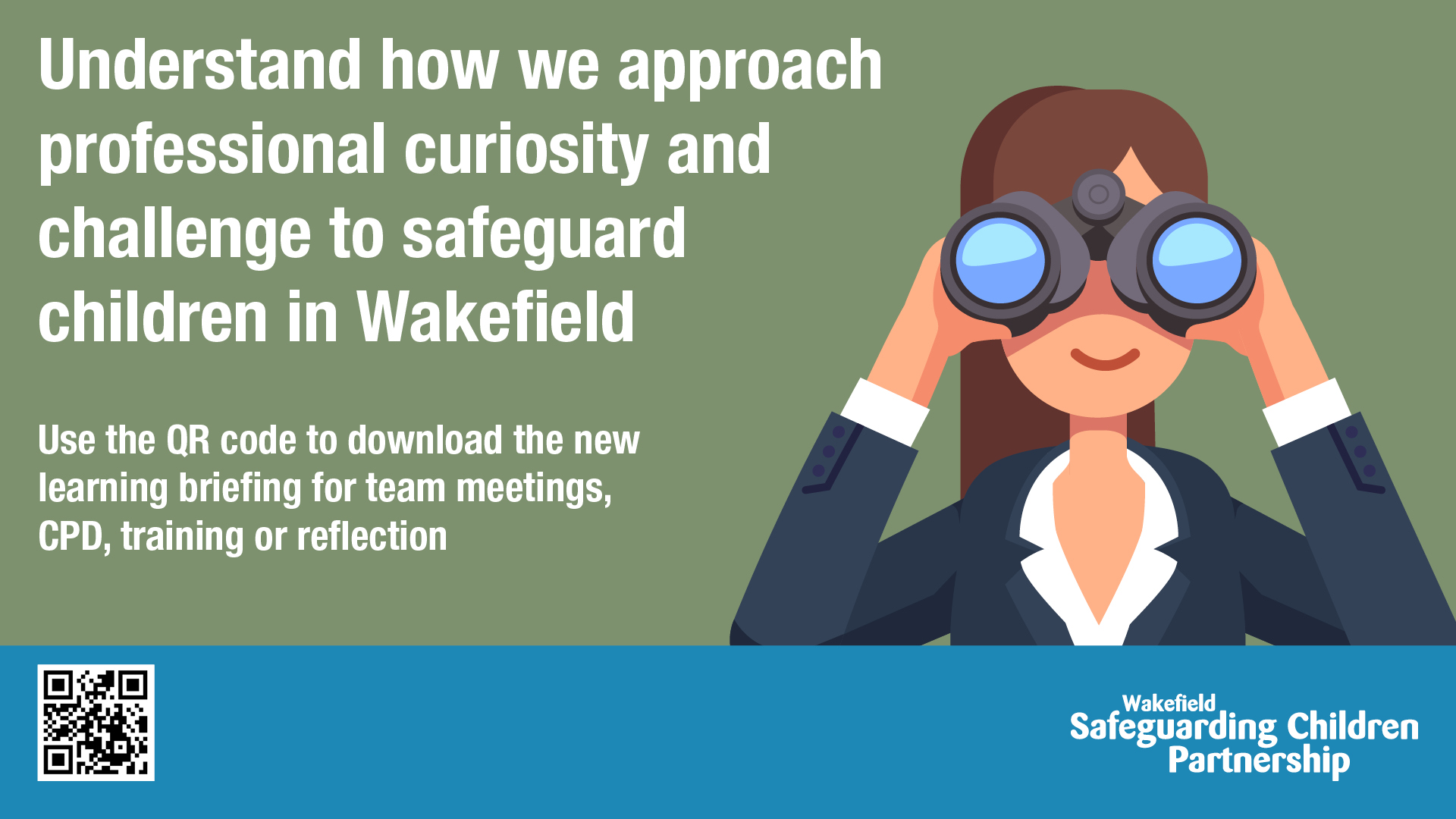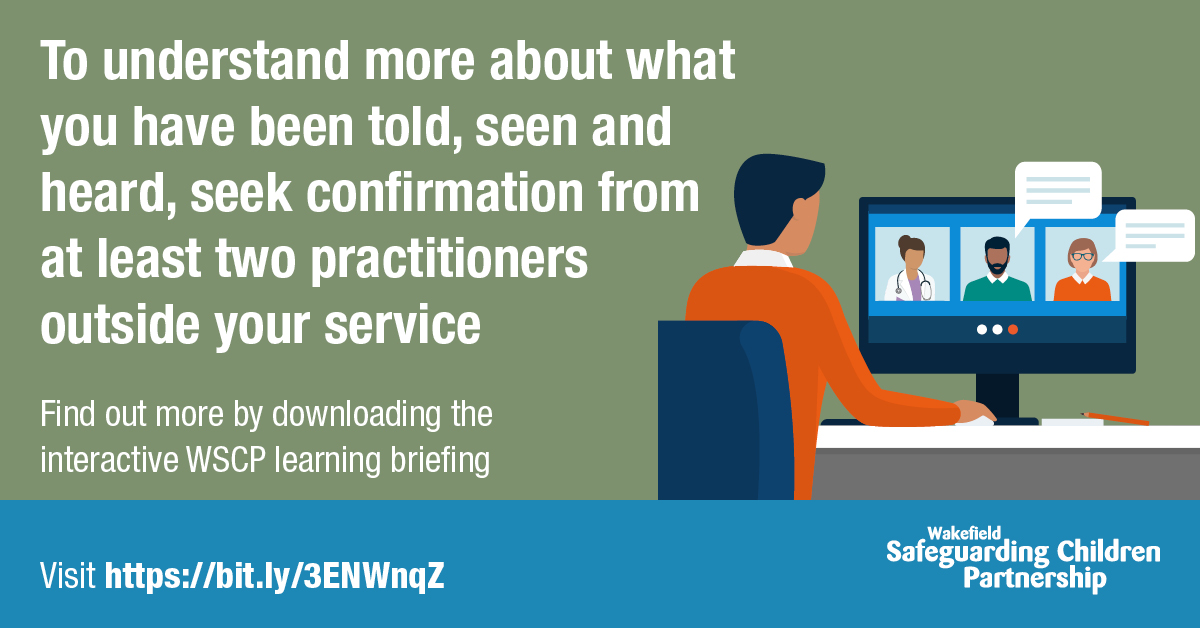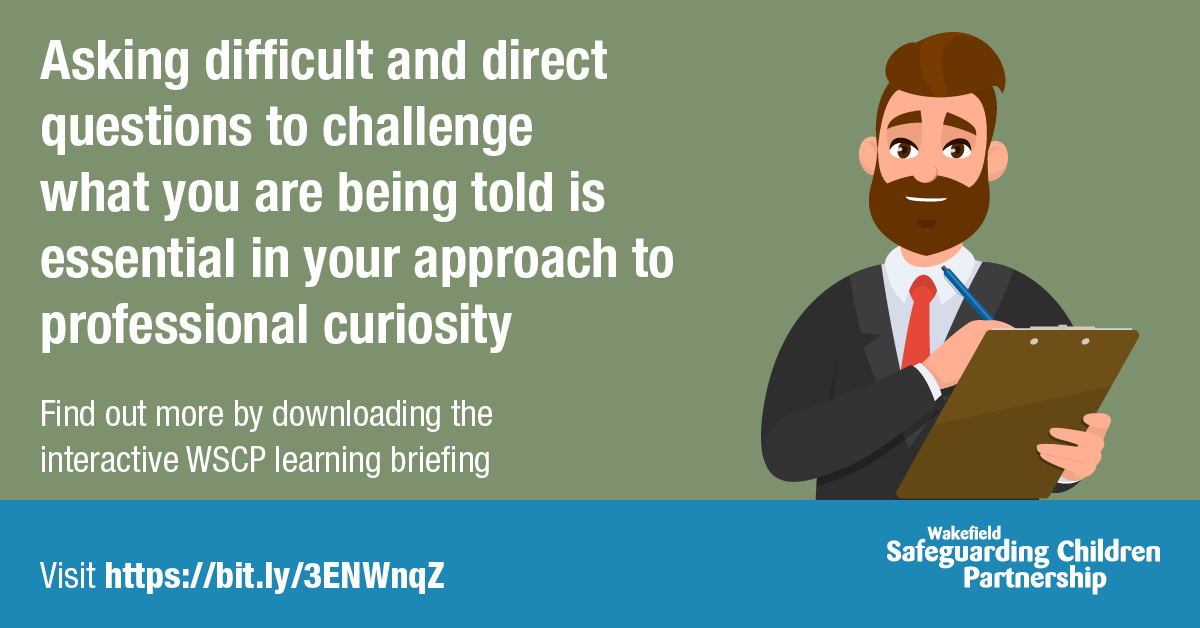Last reviewed November 2023
One Minute Guide to Professional Curiosity & Challenge
What is Professional Curiosity

To be professionally curious a practitioner will ensure their assessment of a child/ren and their family is holistic by trying to understand what is happening around them, rather than making assumptions and taking things at face value.
Professional Curiosity is a recurring theme in serious case / child safeguarding practice reviews. We know that in Wakefield we need to better embed what it means to be professionally curious and challenging by being ‘respectful nosey’. Where practitioners are eager and willing to engage with children and their families or carers we know that assessment of risk is much more robust, information is sought from other agencies and shared and the practitioner has a good understanding of potential barriers.
-
Show details
 Why is it important ? A lack of professional curiosity can lead to:
Why is it important ? A lack of professional curiosity can lead to:
· less obvious indicators of abuse, neglect, significant harm and vulnerability being missed
· making inaccurate assumptions when assessing the child’s needs and the potential risk posed to a child a
· Wrong interventions being put in place putting the child or family in further danger
Practitioners will often come into contact with a child, young person, adult or their family when they are in crisis or vulnerable to harm. These interactions present crucial opportunities for protection. Responding to these opportunities requires the ability to recognise potential vulnerabilities and risks of harm, maintaining an open stance of enquiring deeper, and understanding one’s own responsibility in how to take further action. The need for empathy is deep rooted in professional curiosity.
“Empathy is seeing with the eyes of another, listening with the ears of another, and feeling with the heart of another.” Alfred Adler
Practical Tips
Children in particular rarely disclose abuse and neglect directly to practitioners. Try to:
- Observe patterns of behaviour and non-verbal cues. What are they ’not’ saying?
- Understand a families ‘lived’ experience. Where possible observe parenting styles rather than ‘asking’ about it but remember appearance is not always the same as reality!
- Build a trusting relationship; work ‘with’ parents
- Prepare how you will ‘approach’ a family before your visit
- Present alternative hypotheses
- Keep assessments free from jargon; be specific, use examples and give detailed accounts of what you see/hear.
- Co-ordinate support by triangulating information with at least 2 other agencies; share your concerns / findings
- Reflect on your own assumptions and bias

-
Show details
 How do we become more curious? · Test your professional gut feeling by not making assumptions about a family
How do we become more curious? · Test your professional gut feeling by not making assumptions about a family
· Collate information from different sources to help you make predictions about what is likely to happen in the future. This may be from members of the family, to family friends or other agencies such as school, health colleagues social care the police or community leads. This will help you gain a better understanding of the family.
· Look past the obvious. Are you observing any behaviour which is indicative of abuse and neglect? Does what you see support or contradict what you are being told?
· Listen Is someone trying to tell you something but finding it difficult? If so, how can you help them?
· Ask the questions you need to help you clarify your concerns. Use open ended questions which are non judgemental to promote honest conversations.
· Check it out! Don’t be afraid to seek clarification from other practitioners. Serious case reviews have told us that practitioners should seek assurance to invoke discussion from at least two other agencies.
· Reflect on ALL the information you have gathered from non verbal cues to verbal accounts to professional opinion and fact.Be open to the unexpected, and incorporate information that does not support your initial assumptions into your assessment of what life is like for the child or adult in the family.
-
Show details
 Stay impartial and remain empathetic It is sometimes difficult to stay impartial but to have open and honest conversations with children and families that may need your help, it is important to stay objective and calm and to have a good self awareness of your own needs and potential biases. Empathy is at the heart of establishing any healthy relationship and will help you as a practitioner to remain unbiased and focussed. Ask yourself ‘what must it be like for this family‘ to experience… cyber bullying for e.g. be non-judgemental.
Stay impartial and remain empathetic It is sometimes difficult to stay impartial but to have open and honest conversations with children and families that may need your help, it is important to stay objective and calm and to have a good self awareness of your own needs and potential biases. Empathy is at the heart of establishing any healthy relationship and will help you as a practitioner to remain unbiased and focussed. Ask yourself ‘what must it be like for this family‘ to experience… cyber bullying for e.g. be non-judgemental. -
Show details
 Why is challenge important? The next step to curiosity is challenge. Be open to having your own assumptions challenged by other agencies and the family you are supporting and be open to challenging others. Challenge is a process by which we can help to keep the child/ren and family safe and should not be seen as a negative reaction to the practitioner. If you think you need more support in having challenging conversations with parents speak to your supervisor.
Why is challenge important? The next step to curiosity is challenge. Be open to having your own assumptions challenged by other agencies and the family you are supporting and be open to challenging others. Challenge is a process by which we can help to keep the child/ren and family safe and should not be seen as a negative reaction to the practitioner. If you think you need more support in having challenging conversations with parents speak to your supervisor.
What barriers might you face?
It is important to recognise any potential barriers and work with the child, young person or family to overcome these. When barriers may be coming from an individual or family it is important to work restoratively with them, explaining why you are asking questions or seeking clarification so they understand it is to help support the family. Building a trusting relationship where you can be kind and compassionate is essential in earning the right to have those honest and open discussions, where challenge sits in a safe space.
-
Show details
 Online interaction If you cannot meet face to face with a family or child this may challenge the opportunity for professional curiosity. It may be more difficult to observe behaviours, physical conditions or environmental factors, it can be difficult to determine if a person is alone, feels able to talk freely or determine if they are being coerced. Therefore, you may need to be more creative, for example by asking if the conversation can be overheard whilst observing body language for non verbal cues. This may help inform your observations and help you gather information.
Online interaction If you cannot meet face to face with a family or child this may challenge the opportunity for professional curiosity. It may be more difficult to observe behaviours, physical conditions or environmental factors, it can be difficult to determine if a person is alone, feels able to talk freely or determine if they are being coerced. Therefore, you may need to be more creative, for example by asking if the conversation can be overheard whilst observing body language for non verbal cues. This may help inform your observations and help you gather information.
-
Show details
Over optimism / Fixed Thinking
Are you being realistic in your assumptions of capability in your assessment? Practitioners may assume parental capacity or miss cues of neglect, for example in cases of affluent neglect a child may be experiencing emotional neglect or be victims of domestic abuse. A child may smile and appear happy; are they demonstrating happiness or as a protection response, are they communicating that they are not a threat? -
Show details
 Lacking Confidence or knowledge We may not feel confident to ask sensitive questions or may lack some practical experience, in particular technology when assessing online harm.
Lacking Confidence or knowledge We may not feel confident to ask sensitive questions or may lack some practical experience, in particular technology when assessing online harm. -
Show details
 Confirmation bias Sometimes we are unaware of our own bias or prejudice and this can lead to incorrect assumptions about a situation as demonstrated in the CSPR concerning Child Q who was inappropriately strip searched in school by police.
Confirmation bias Sometimes we are unaware of our own bias or prejudice and this can lead to incorrect assumptions about a situation as demonstrated in the CSPR concerning Child Q who was inappropriately strip searched in school by police. -
Show details
Hostile and Non-engagement
Parents may misrepresent situations giving the appearance of co-operation to avoid raising suspicions and allay concerns. “Published case reviews highlight that professionals sometimes delay or avoid interventions due to parental disguised compliance.” NSPCC – Disguised compliance: learning from case reviews (2016) To find out more visit the safeguarding network dedicated page at Disguised compliance – Safeguarding Network and Learning from case reviews: disguised compliance (nspcc.org.uk) -
Show details
Culture
Be mindful of cultural differences, preconceived ideas and unconscious bias. Are there different expectations and social norms within a particular family or group? For example, physical chastisement may be a result of a parents own upbringing—you may need to support a parent to use other strategies. Did you refuse to accept food from an Asian family where this may be a sign of disrespect? Has passionate communication been misread as argumentative?
Resources
For advice on how to be Professionally Curious in a school setting
www.thesafeguardingcompany.com/resources/blog/what-is-professional-curiosity/
For advice on Policing matters and Professional Curiosity
www.college.police.uk/guidance/vulnerability-related-risks/curiosity
To view and download our WSCP campaign material on Professional Curiosity & Challenge click on the image below
Reports / useful reading
- Inappropriate language. A SCR on the lack of professional curiosity and CSE of 373 children (Oxfordshire 2015)
- The impact of language & CCE The Children’s Society
- Summary of the national review into the murders of Arthur Labinjo-Hughes and Star Hobson (nspcc.org.uk)
- Unseen men: learning from case reviews | NSPCC Learning
- Haringey serious case reviews: child A - GOV.UK (www.gov.uk)

Tools & Further Learning
For easy read guidance, case studies and approaches on Professional Curiosity & Challenge download the WSCP Learning Briefing. This can be used for CPD, team meetings, training and reflection during supervision.
Visit WSCP page to download a series of YHMAST Professional Curiosity sessions on Contemporary research (highly recommended), Supervising a Professionally Curious Workforce, Why we need to understand the digital world with empathy, Disrupting Perpetrators and Disguised compliance
Curious for more?
![]()
- Read more about unconscious bias, access quick training and practical steps to address this. Click here or take the test. Do you have implicit bias? Test here.
- Read more about cognitive bias here
- The What Works centre—excellent evidence store dashboard for recommended interventions based on effectiveness and strengths.



